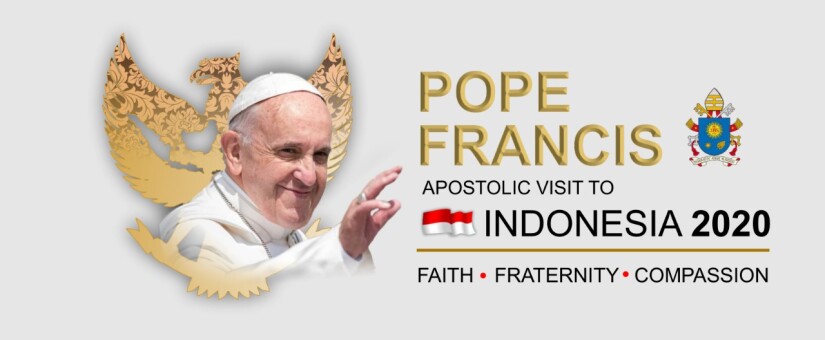
Homily of Pope Francis – GBK Stadium, 5 September 2024
APOSTOLIC JOURNEY OF HIS HOLINESS POPE FRANCIS
TO INDONESIA, PAPUA NEW GUINEA,
TIMOR-LESTE AND SINGAPORE
2-13 September 2024
Homily at Holy Mass
Jakarta, Gelora Bung Karno Stadium
5 September
The encounter with Jesus calls us to live out two fundamental attitudes that enable us to become his disciples: listening to the word and living the word. First, listening, because everything comes from listening, from opening ourselves to him, welcoming the precious gift of his friendship. Then it is important to live the word we have received, so as not to listen in vain and deceive ourselves (cf. Jas 1:22). Indeed, those who risk listening only with their ears do not allow the seed of the word to descend into their hearts and thus change their way of thinking, feeling and acting. The word given, and received through listening, wishes to become life in us, transform us and become incarnate in our lives.
The Gospel that was just proclaimed helps us to reflect on these two essential attitudes: listening to the word and living the word.
First of all, listening to the word. The Evangelist relates that many people flocked to Jesus and “the crowd was pressing in on him to hear the word of God” (Lk 5:1). They were looking for him, hungering and thirsting for the word of the Lord and they heard it resound in the words of Jesus. This scene, then, repeated many times in the Gospel, tells us that the human heart is always searching for a truth that can feed and satisfy its desire for happiness. We cannot be satisfied by human words alone, the thinking of this world and earthly judgments. We always need a light from on high to illuminate our steps, living water that can quench the thirst of the deserts of the soul, consolation that does not disappoint because it comes from heaven and not from the fleeting things of this world. In the midst of the confusion and vanity of human words, there is need for the word of God, the only true compass for our journey, which alone is capable of leading us back to the true meaning of life amid so much woundedness and confusion.
Brothers and sisters, let us not forget that the first task of the disciple is not to clothe ourselves with an outwardly perfect religiosity, do extraordinary things or engage in grandiose undertakings. The first step, instead, is to know how to listen to the only word that saves, the word of Jesus. We can see this in the Gospel scene, when the Master climbs into Peter’s boat to distance himself a little from the shore and thus preach better to the people (cf. Lk 5:3). Our life of faith begins when we humbly welcome Jesus into the boat of our lives, make room for him, listen to his word and let ourselves be questioned, challenged and changed by it.
At the same time, the word of the Lord asks to be incarnated concretely in us so we are called to live the word. Indeed, after he has finished preaching to the crowds from the boat, Jesus turns to Peter and challenges him to take the risk of betting on that word, “Put out into the deep water and let down your nets for a catch” (v. 4). The word of the Lord cannot remain as a fine abstract idea or stir up only a passing emotion. It asks us to change our gaze and allow our hearts to be transformed into the image of Christ’s heart. It calls us to cast courageously the nets of the Gospel into the sea of the world, running the risk of living the love that he first lived and in turn taught us to live. The Lord, with the burning power of his word, also asks us to put out to sea, break away from the stagnant shores of bad habits, fears and mediocrity and dare to live a new life.
Of course, there are always obstacles and excuses for saying no to this call. Let us look again at Peter’s behaviour. He had come to shore after a difficult night of not catching anything. He was tired and disappointed, and yet, instead of remaining paralyzed by that emptiness or impeded by his own failure, he says: “Master, we have worked all night long but have caught nothing. Yet, on your word, I will let down the nets” (v. 5). On your word, I will let down the nets. Then, something unheard of happens, the miracle of a boat filling up with fish until it almost sinks (cf. v. 7).
Brothers and sisters, faced with the many responsibilities of our daily lives, together with the call we all feel to build a more just society and move forward on the path of peace and dialogue, which has long been the case in Indonesia, we can sometimes feel inadequate. We sometimes feel the weight of our commitment and dedication that does not always bear fruit, or of our mistakes that seem to impede the journey we are on. We too are asked not to remain prisoners of our failures or keep our eyes fixed only on our empty nets, but, with the same humility and faith as Peter, look to Jesus and trust him. Even when we have passed through the night of failure and times of disappointment when we have caught nothing, we can always risk going out to sea and cast our nets again.
Saint Teresa of Calcutta, whose memory we celebrate today and who tirelessly cared for the poorest of the poor and became a promoter of peace and dialogue, used to say, “When we have nothing to give, let us give that nothing. And remember, even if you reap nothing, never tire of sowing”.
Brothers and sisters, I would also like to say to you, to this nation, to this wonderful and varied archipelago, do not grow weary of setting sail and casting your nets, do not grow weary of dreaming and building again a civilization of peace! Always dare to dream of fraternity! Guided by the word of the Lord, I encourage you to sow seeds of love, confidently tread the path of dialogue, continue to show your goodness and kindness with your characteristic smile and be builders of unity and peace. In this way, you will spread the fragrance of hope around you.
The Bishops of the country recently expressed a desire that I too would like to communicate to all the Indonesian people: walk together for the good of the Church and society! Be builders of hope, the hope of the Gospel, which does not disappoint (cf. Rom 5:5) but instead opens us up to endless joy.



0 Comments